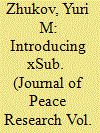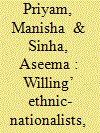|
|
|
Sort Order |
|
|
|
Items / Page
|
|
|
|
|
|
|
| Srl | Item |
| 1 |
ID:
167285


|
|
|
|
|
| Summary/Abstract |
Researchers today have access to an unprecedented amount of geo-referenced, disaggregated data on political conflict. Because these new data sources use disparate event typologies and units of analysis, findings are rarely comparable across studies. As a result, we are unable to answer basic questions like ‘what does conflict A tell us about conflict B?’ This article introduces xSub – a ‘database of databases’ for disaggregated research on political conflict (www.x-sub.org). xSub reduces barriers to comparative subnational research, by empowering researchers to quickly construct custom, analysis-ready datasets. xSub currently features subnational data on conflict in 156 countries, from 21 sources, including large data collections and data from individual scholars. To facilitate comparisons across countries and sources, xSub organizes these data into consistent event categories, actors, spatial units (country, province, district, grid cell, electoral constituency), and time units (year, month, week, and day). This article introduces xSub and illustrates its potential, by investigating the impact of repression on dissent across thousands of subnational datasets.
|
|
|
|
|
|
|
|
|
|
|
|
|
|
|
|
| 2 |
ID:
193624


|
|
|
|
|
| Summary/Abstract |
Using evidence regarding the consolidation of Hindu nationalism in India we put forward new ethnographic data about the variety of popular support for a Hindutva project and a new framework that proposes an interactive theory of social identity. This framework helps us understand how Hindu nationalism becomes embedded in society. We assert that Hindu nationalism in India could be fruitfully analysed by focusing on the processes through which ideas of exclusive nationalism spread among ordinary middle-class people and are expressed in micro-level psychological changes at the individual level. The consolidation of Hindu nationalism in India is being authored not only by parties or the state, but also by societal actors, specifically, ordinary middle-class Indians. Hindu nationalism has been spreading in micro-public spheres in a time of apparent peace and between elections, and with the participation of willing supporters. Building on our fieldwork and research in psychology and history, our conversations have also helped us to identify profiles of different types of nationalists, which we categorize as willing ethnic-nationalists, hardliners, bystanders, and moderates. Further, we suggest the need to focus on inter-linked micro-level mechanisms such as diffusion and emulation of Hindu-centric beliefs and ideas, mobilization by hardliners and organizations, and impunity resulting from protection by state agencies, which helps to create willing ethnic-nationalists and sustains Hindu nationalism. Evidence regarding social interactions from a variety of survey organizations concurs with our findings and our ethnographic material allows us to delve deeper into varieties of Hindu nationalist support across diverse ordinary people.
|
|
|
|
|
|
|
|
|
|
|
|
|
|
|
|
|
|
|
|
|